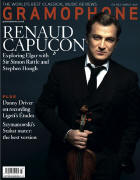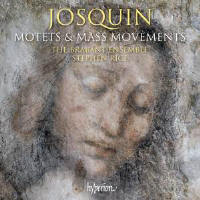Texte paru dans: / Appeared in: |
|
|
Outil de traduction (Très approximatif) |
|
|
Reviewer:
Fabrice Fitch Because of his ‘topdog’ status among early Renaissance composers, questions of attribution loom particularly large in Josquin research. The issue is tackled head-on in this engaging programme, which includes a number of works over whose attribution debate is possible, and three securely ascribed ones to which one or more voices were added by a later composer – or perhaps, for Huc me sydereo, by Josquin himself. These ‘expanded’ versions are worth the price of admission. The added voice in the Stabat mater (placed just above Josquin’s highest) draws the piece uncannily into the sound world of Eton Choirbook settings of the same text. (The other motet with added voices is O bone et dulcissime Jesu, where the clarity of the original is obscured with fewer apparent gains.) Since doubts of attribution have tended to discourage recordings of some of the other pieces (Usquequo, Domine appeared on La Chapelle Royale’s motet anthology in the mid-1980s – Harmonia Mundi, 4/87), The Brabant Ensemble’s selection has the charm of rarity. One of its most satisfying offerings is the parallel setting of the chants Alma redemptoris mater and Ave regina caelorum, a tour de force that feels very Josquinian while carrying unmistakable echoes of Dufay and Ockeghem. The performances are clear and legible but a touch over-cautious; in the longer pieces, rival versions pull off faster tempos to better effect (Pro Cantione Antiqua’s Huc me sydereo, for example – DG, 9/78 – or O bone et dulcissime Jesu and Stabat mater from La Chapelle Royale; their Usquequo, Domine shaves three minutes off The Brabant’s and renders its pacing and rhetoric more compellingly). Undoubtedly, these singers can make more of the music’s expressive potential: one of Huc me sydereo’s bullseyes is the descending passage setting ‘descendere jussit Olympo’, to which the basses in particular respond with feeling; one could have done with more touches like this. A comparison with Cappella Amsterdam’s recent Josquin motet anthology (Harmonia Mundi, 12/18) gets at technical aspects – blend, but also consistency of intonation – that blunt this ensemble’s edge. (That said, it’s not helped, to my ear, by an indistinct acoustic.) A qualified recommendation, then; but this rarely heard Josquin has much to tell us. |
|




